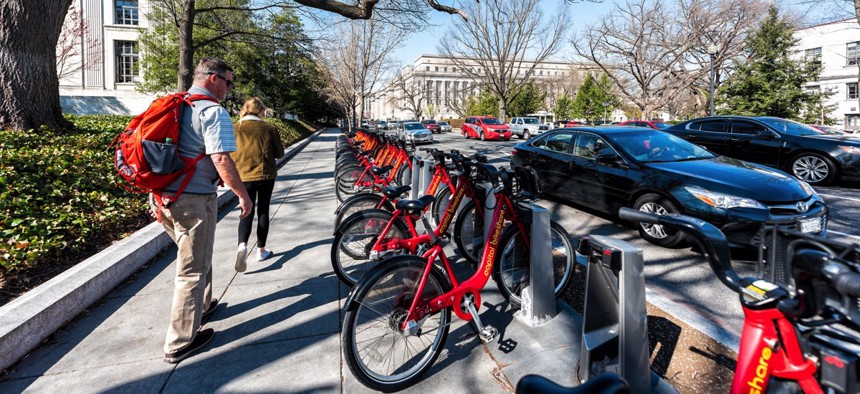Bike Share Continues to Have an Equity Problem

A Capital Bikeshare station in Washington, D.C.
Washington, D.C made it a goal to place more bike stations in disadvantaged neighborhoods, but wealthier, white areas are favored while usage remains low in predominantly black wards.
WASHINGTON — Making a service like bike share available in poorer neighborhoods doesn’t mean people will use it.
A new analysis by the Urban Institute of efforts to expand the reach of the District of Columbia’s bike share program into disadvantaged communities shows that improving accessibility will require more than just increasing the number of stations.
The think tank examined 2017 Capital Bikeshare data and found the five stations members used least were all stations added toward the end of that year in Wards 7 and 8—predominately black and low income neighborhoods—during an expansion of the city’s bike network.
Excluding those stations, four of the five least-used stations also remained east of the Anacostia River in those wards.
“There is a lack of incentives to use bike share across the river,” said Yipeng Su, research associate at Urban Institute and coauthor of the analysis. “There aren’t as many jobs there, tourist attractions or community centers within 20 minutes biking.”
Promoting equity requires community investments east of the river to boost economic activity, especially as Capital Bikeshare contemplates even more stations, Su added.
Capital Bikeshare did not respond to a request for comment in time for publication.
This is not the only study to find that bike share services aren’t expanding transportation options in low-income communities. A study out of Portland State University last year that surveyed residents in neighborhoods of Philadelphia, Chicago and Brooklyn found that people of color and poorer residents expressed interest in the ability to rent a bike for fun or to get to work, but faced barriers like not having a credit card or finding the cost to be prohibitive.
The Urban Institute found many of the same issues in Washington, D.C. Because many residents of Wards 7 and 8 are below the poverty line, the requirement that users put up a $100 down payment via credit card for membership is a significant barrier to entry for would-be casual riders, Su said.
The Urban Institute could not obtain data on how many local riders receive Capital Bikeshare’s advertised $5 memberships or cash payment options as an alternative to the down payment.
Wards 7 and 8 accounted for 10 percent of all Capital Bikeshare stations in D.C. in 2017 but generated only 0.5 percent of all trips that year.
While 37 percent of trips beginning east of the river ended across the river, only 0.1 percent of trips went the other way.
Travel lopsided in one direction indicates the bulk of economic and educational opportunities are west of the river, Su said.
Despite 66 percent of D.C. census tracts having at least one Capital Bikeshare station, most remain in better educated, higher-income, whiter neighborhoods.
Among all stations, 67 percent are within half a mile of a Metro station and 99 percent within half a mile of a Metrobus stop.
The most-used station of 2017 was one of several at Union Station helping solve last half-mile issues accessing transit and trains, Su said.
“Yes, there needs to be more stations near the Metro, but there also needs to be more stations where needed,” she said.
Outside of placement, better outreach on the part of Capital Bikeshare and the city is needed, Su added. Capital Bikeshare used an online platform for suggesting new stations, but that just means responses were skewed toward better educated, internet-savvy users.
The bike share system would also be wise to partner with community organizations that work with disadvantaged residents and can help acclimate them to the service, Su said.
“Bike share, by itself, can’t solve all the equity problems in the city,” she said. “So we think it’s really important the [District Department of Transportation] or Capital Bikeshare works with other organizations to really create physical or economic infrastructure.”
Dave Nyczepir is a News Editor at Route Fifty and is based in Washington, D.C.
NEXT STORY: Costly Natural Disasters Becoming More Frequent






